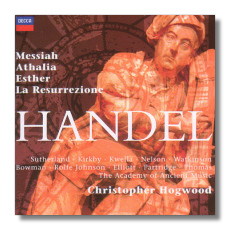
The Internet's Premier Classical Music Source
Related Links
- Handel Reviews
- Latest Reviews
- More Reviews
-
By Composer
-
Collections
DVD & Blu-ray
Books
Concert Reviews
Articles/Interviews
Software
Audio
Search Amazon
Recommended Links
Site News
 CD Review
CD Review
George Frideric Handel

Oratorios
- Messiah
- Athalia
- Esther
- La Resurezzione
Joan Sutherland – Athalia
Emma Kirkby – Josabeth · Israelite woman · Angelo · Messiah – soprano 2
Patrizia Kwella – Esther · Maddalena
Judith Nelson – Messiah – soprano 1
Carolyn Watkinson – Messiah · Cleofe
Aled Jones – Joas
James Bowman – Joad
Ian Partridge – Mordecai · San Giovanni
Anthony Rolfe Johnson – Mathan · Ahasuerus
Paul Elliott – Messiah · 1st Israelite
David Thomas – Messiah · Abner · Haman · Lucifero
The Academy of Ancient Music/Christopher Hogwood
Decca Collectors Edition 475673-1 465m DDD
This is a wonderful set which should be in everyone's library, if you do not have all of these works already in their original format. 'La Resurrezione' is an early work dating from Handel's years in Rome. It was premièred in 1708, after a commission by the Marchese Ruspoli with considerable success, and in it, the composer displays the energy and imagination to be found in his later works, although as far as I know this is the only oratorio that does not contain any choruses.
'Esther' probably dates from the summer of 1718 and is considered to be the first 'English oratorio'. By this time, Handel had mastered the art of chorus writing and this work is a testimony to the creative personality he had by then become. Composed for private consumption, this hampered its popularity no end, and when it was finally revived in 1732, Handel substantially revised the score. The version recorded here is the original 1718 composition which is by far superior to the so called second 'edition'.
Within two years, Handel had composed two new oratorios, 'Deborah' and 'Athalia'. With 'Athalia', Handel definitely established the oratorio genre on strong grounds, not only because of its dramatically satisfying libretto (Samuel Humphreys), but also because of his ability to integrate the choruses in the heart of the action. Above all the composer's skill, flexibility and confidence are all brought to the fore in a most striking manner. Athalia was premièred in July 1734 to a resounding success.
The last work in this admirable compilation is the perennial favourite, 'Messiah', first performed in April 1742. Due to the vast popularity of this work, I feel I need not dwell on the innumerable merits of this composition. All I need say is that 'Messiah' was initially not as successful as one might think, and it was only after several performances in aid of Thomas Coram's Foundling Hospital during the 1750's that the oratorio captured the public's imagination.
Soloists, choirs and the Academy of Ancient Music under Christopher Hogwood deliver memorable performances full of drama, passion and very often, stirring excitement. In contrast, moments of peace and reflection are interpreted with grace and noble gentleness worthy of the music. Despite being taped in the early 80's, these recordings have remained fresh and immediate, a tribute to the engineers responsible for all the undertakings. Although the libretto omits the full texts (only synopsis of the stories are included), this set still remains a compelling proposition, particularly at its attractive price.
Copyright © 2005, Gerald Fenech


















